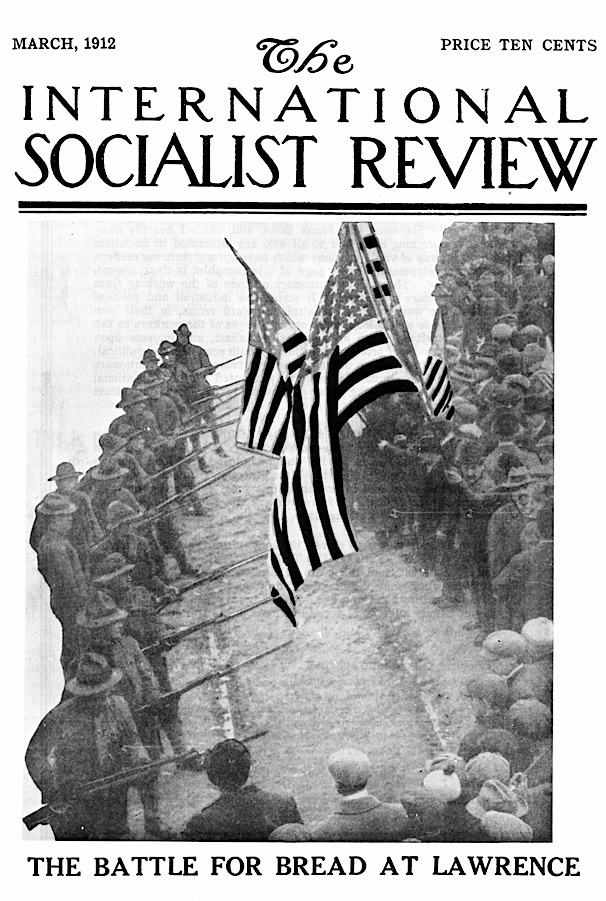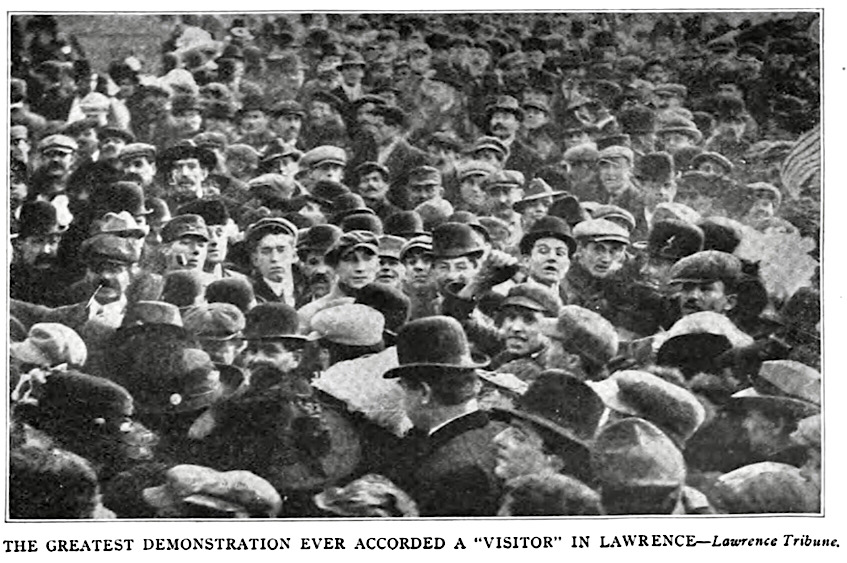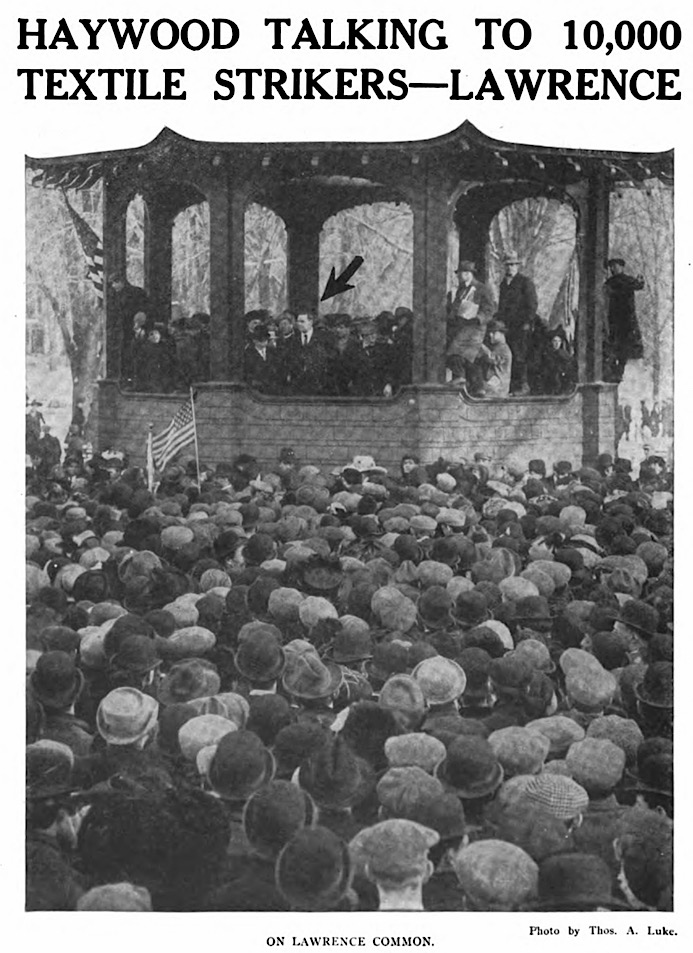 —————
—————
Hellraisers Journal – Tuesday March 5, 1912
“The Battle for Bread at Lawrence” by Mary E. Marcy, Part II
From the International Socialist Review of March 1912
-Haywood Arrives in Lawrence, Massachusetts:
[By Mary E. Marcy]
—–Haywood Arrives.
January 24 Haywood reached Lawrence to help carry on the strike. We quote from the Evening Tribune, Lawrence:
William D. Haywood arrived in Lawrence at 11.50 o’clock from New York City Wednesday morning and over 10,000 strikers turned out together with three bands and two drum corps, to greet him at the North station with a tremendous ovation.
Long before the time when he was scheduled to arrive the strikers assembled at the depot in eager anticipation of the coming of the famous labor organizer. Even at 9 o’clock there was a large crowd awaiting his arrival. Before 10 o’clock the number of strikers at the station had been greatly increased. The sidewalks on Essex street were filled to their greatest capacities. Common street was crowded all morning also with strikers wending their way to the Boston & Maine station. About 10:30 o’clock the Franco-Belgian band arrived, having marched from the Franco-Belgian hall on Mason street. This band was followed by about 200 of the Franco-Belgian element of the strikers. The band stopped in front of the postoffice and played several selections.
The number of strikers was being continually augmented and the crowd seemed to be growing restless. About 11 o’clock a parade of about a thousand strikers came up Essex street. In this parade were the Umberto and the Bellini bands and St. Joseph’s drum corps.When this contingent arrived there was great cheering. The bands played almost continuously and there was a great deal of noise. Every time that the cab train came in sight the crowd would commence cheering and the bands would play with renewed vigor.
Shortly after 11:30 o’clock a large parade came up Common street and joined forces with the strikers already at the station. At the head of this parade there was a sign painted on cardboard in large black letters,
“All in One.”
There were many American flags carried by the strikers.
Finally the time for the arrival of Mr. Haywood came and when the train came in sight there was a great demonstration. When the train was approaching the crowd kept pushing up near the tracks and it looked as if someone would be run over.
When the strikers caught sight of Haywood they went almost insane with delight and cheered incessantly while the bands and drum corps boomed out stirring selections. The scene was certainly a wild one. As Mr. Haywood came out of the car he took off his hat and waved it to the crowd. The strikers surrounded Haywood and then the parade started down Common street. Haywood was near the head of the parade and was surrounded by thousands of howling and cheering strikers.The parade was over 10,000 strong. The bands played and excitement of the highest pitch prevailed.
In the afternoon a monster mass meeting was held on the commons. Arthur Giovanitti [Arturo Giovannitti], editor of a New York Italian Socialist paper and Adam Olzewski, editor of the Polish Daily People, addressed the crowd in Italian and Polish. John Mullen and S. J. Pothier of the Shoe Workers’ Protective Union of Haverhill, presented $800 to the strikers on behalf of their organization, promising more to come. Ettor also spoke.
When Haywood was introduced there was such an enthusiastic demonstration that it was many moments before he could make himself heard. He said in part:
Sister and Brother workers: There are times in every man’s life when he feels that words cannot express his feelings. That is the way that I feel now when I look out into this sea of faces. The ovation that was given to me this morning was certainly marvelous and I deeply appreciate it. Mr. Ettor has told you of my history with the I. W. W. My dream in life is to see all workers united in one big union. You should carry this idea into effect because without it you will be forced back into the mills and have even worse conditions, not only in the textile works, but all workers. It behooves you to stick together and fight this present strike to a finish. You will win out if you are loyal to yourself. l saw in one of the papers that Lawrence was afraid of my coming. It is not Lawrence that fears my coming, it is the bosses and the superintendents and the owners of the mills that fear me. This is a familiar scene to me, to see soldiers guarding mills, as I have often been in just such strikes before, but I have never, in all my experience, seen a strike defeated by soldiers. It is necessary to keep a tight rein on yourselves. If we can prevail on other workers who handle your goods to help you out by going on strike we will tie up the railroads, put the city in darkness and starve the soldiers out.
The only way to make such a condition possible is to have one big union. In London once when there was a strike everything was stopped and it became necessary for the officers of the soldiers to ask permission to carry food to the horses who were starving. In France they stopped the railroads and won a strike in three days. Soon I hope to see the workers so organized that when the mills in Lawrence go on strike, for instance, the mills in every city will go on strike. In this way you will lock the bosses out for once and for all. You have been ground down terribly in these mills. I can see that by your faces. Let me urge you on in this strike. I came here to say that the working class all over the country will help you out. In a few days I am going to the west and in every city that I go to I will say to the unions: “Help the strikers in Lawrence by sending provisions and money.” Don’t let the bosses fool you. This international question will never be solved unless you solve it yourselves. Stand heart to heart, mind to mind, and hand to hand with all your fellow workers and you will win out.
All you people come from other nations and you all come to America with the expectation of improving your conditions. You expected to find a land of the free, but you found we of America were but economic slaves as you were in your own home. I come to extend to you tonight the hand of brotherhood with no thought of nationality. There is no foreigner here except the capitalist and he will not be a foreigner long for we will make a worker of him. Do not let them divide you by sex, color, creed or nationality, for as you stand today you are invincible. If the Poles, Italians and Greeks stand together they are invincible. The I. W. W. is composed of different nationalities and with such a fighting committee you can lick “Billy” Wood. “Billy” Wood can lick one Pole, in fact he can lick all the Poles, but he can not lick all the nationalities put together. We have got “Billy” Wood licked now. He never did anything but make trouble.
[“You can’t weave cloth with bayonets.]
You can’t weave cloth with bayonets. The blue cloth that you have woven has gone to clothe those soldiers, but it will wear out. United in this organization we will never weave any more for them; let them go naked.
Don’t let this be a single handed struggle. Join hands with the others. Let us build up a new organization in which every man contributes his part toward the welfare of others. Let us enforce a regime in which no man can make anything for profit.
The only way to win is to unite with all other textile workers. No one branch can get along without the other. The wool sorter is necessary, no matter how stinking his job maybe. You are textile workers but you don’t seem to realize what an important factor you as textile workers are to society. You are the men and women who clothe the world. You make the clothes for the working class and the robes for the rich. The continuance of civilization is in many cases due to your efforts. You are more important to society than any judge on the supreme bench, than any judge, lawyer, politician or capitalist or any man who does not work for an honest living. Those who do nothing are always looked up to as the prominent citizens of a city.
It is an inspiration to see you all together in one great cause. I hope to see the boundary line between all nations broken down and one great nation of the working class. There are only two nations in the world today; the working class on one side and the capitalists on the other. We of the working class must stand together.
—————
[Emphasis added.]
~~~~~~~~~~~~~~~~~~~~~~~~~
SOURCES & IMAGES
International Socialist Review
(Chicago, Illinois)
-March 1912
https://www.marxists.org/history/usa/pubs/isr/v12n09-mar-1912-ISR-gog-Corn.pdf
See also:
Tag: Lawrence Textile Strike of 1912
https://weneverforget.org/tag/lawrence-textile-strike-of-1912/
Bill Haywood’s Book
The Autobiography of William D. Haywood
International Publishers, 1929
https://babel.hathitrust.org/cgi/pt?id=mdp.39015050276461&view=2up&seq=6
-page 239: The Lawrence Strike
https://babel.hathitrust.org/cgi/pt?id=mdp.39015050276461&view=2up&seq=243
Hellraisers Journal – Monday March 4, 1912
“The Battle for Bread at Lawrence” by Mary E. Marcy, Part I
~~~~~~~~~~~~~~~~~~~~~~~~~



